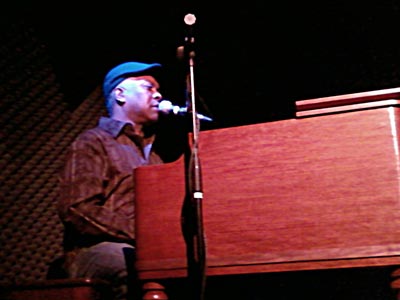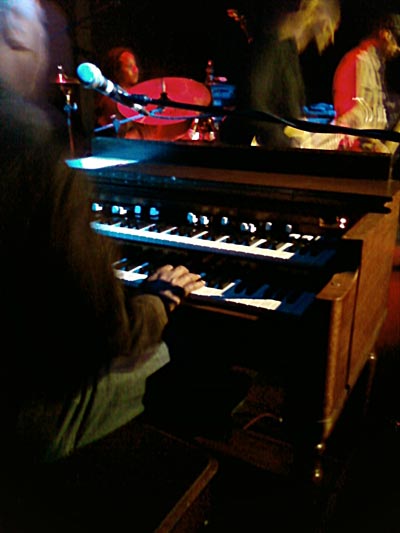Full disclosure: I’m a Hammond B-3 soul and soul-jazz freak, so I’m a homer here. My universe aligns around the likes of great players like Billy Preston, Jimmy Smith, Jimmy McGriff, Al Kooper, and Groove Holmes. Topping my list is Booker T. Jones, one of the prime architects of the Memphis Soul sound. I recently gushed over Booker’s new CD, Potato Hole, at Bullz-Eye. Also, the pictures were taken by my father-in-law, Richard Binder, who accompanied me to the show and used his celly to great effect.

This club gig was a stunner, for a number of reasons. First, that this guy would actually make it out to the sticks of New Hampshire. Maybe, like, an auditorium at Dartmouth or Manchester or Plymouth State…but Tupelo Music Hall in Londonderry? A brutally small crowd of 80 people showed up, but like me, most of them were diehards who collectively “ooooohed” when Booker nonchalantly recited his part in music history between numbers, saying things like “My songwriting partner William Bell and I wanted to write a blues song, and we wrote this next one, ‘Born Under A Bad Sign.’ Albert King first recorded it,” and kicked into it–singing!
Another stunning part was the Hammond sound. I’ve heard many players bash it out, some of them like Tony Monaco and Bruce Katz, whose ornamental, two-handed, two-footed, flashy styles push the technical limits of the B-3’s features as they squeeze every drop of distortion and click out of the instrument. Fun stuff to watch, kind of like the musical equivalent of a Fourth of July fireworks show.
In comparison, Booker’s sound was simple. As always was the case on his records, less is more. He did use that Leslie speaker cabinet to great effect, but for the most part he let his right hand do the vocalizing and let the band do the rest of the heavy lifting. You know this stuff on an intellectual level, listening to the records, but to hear that old organ pumped through state-of-the-art PA digital sound reinforcement…it sounds amazing. The organ sounds like it’s spinning out lush soul textures in 3-D.
How that man can make such old tech sound so immediate, so wonderful…guess that’s why he’s a legend. And this show wasn’t about mailing it in, it was about showing us that it doesn’t matter how soul’s evolved since he first came on the scene as a teenager himself. At 64, he can Booker-fy any song, even OutKast’s “Hey Ya,” which of course sounds a lot more comprehensible when Booker T. makes sense of the chord voicings and lets his fingers do the singing.

Booker T. and his mates ripped through most of Potato Hole, and mixed things up by tossing in classics like “Green Onions,” “Hip Hug-Her,” and the aforementioned “Bad Sign” and “Time is Tight.” By far the most interesting selection of the set list was “Melting Pot,” used as a long solo showcase feature for everyone on stage toward the end of the show. A lost Booker T. tune, the urban, jazzy, and definitely funk-groovin’ track served as the title cut of group’s 1971 record of mostly originals. It was at this point Booker T. & the MGs busted free of the cover tunes they’d done all through the ’60s. “Melting Pot” would be the group’s last single, and is one of those underground classics from which rappers and DJs have mined many samples. Live in Londonderry, it fit in well, bridging the ’60s pop of “Green Onions” and Booker’s new stuff, which rocks out in comparison.
The quite capable band he assembled for this gig–he has the Drive-By Truckers backing him elsewhere, and probably draws upon regional players he knows across the U.S.A–included Worcester guitar madman Troy Gonyea, whom I first saw 10 years ago, backing Kim Wilson as a teenager. Now in his mid-20s Gonyea’s clearly stepped up his game and is a worthy sideman to the great Booker T., rarely overstepping his bounds and doing his best Steve Cropper, but also playing the heavy that Neil Young does with his lines on the Potato Hole record, when cuts like “Native New Yorker” and “Pound It Out” call for it.
Mostly, the experience was a stunner because you read in books and online, over and over, descriptions along the lines of “Booker’s a humble, affable guy, never really changed over the years, blah blah blah.” That, remarkably was true. Down to the last moments of the show, when the band knocked out an extended “Time Is Tight” with a quiet, extended intro that developed into full rock bluster…and at least a third of the crowd rushed up to the stage to grab autographs (me included), because the guy’s never been up here in my lifetime and who knows if he ever will again?
“Thanks for coming up to our neck of the woods,” I told him as he signed my Soul Dressing CD booklet.
“It’s beautiful up here,” he said with his trademark half-grin. The man who played Monterey Pop and was the wind beneath Otis Redding’s, Wilson Pickett’s and Sam And Dave’s wings. The same Booker T. who witnessed the rise of Stax and watched it fall as Atlantic basically took its meal tickets, only to be reborn with the likes of songwriter and session player Isaac Hayes coming into his own as a solo artist in the late ’60s and ’70s. And, eventually, watched Stax crumble again for good. That Booker T.
“You’re beautiful tonight, man,” I replied, and took my leave as he called up the band to do an encore, a cover of Tom Waits’ “Get Behind the Mule.”
For this fan who was born after Booker T’s commercial peak and who discovered his music long after he quit touring, it was like Christmas to have him just show up and play his 13 songs. Other acts I’d hammer for playing about 80 minutes for a $33 cover charge. Not this guy, not this night. Long live Booker T. If he comes to your neck of the woods on his current tour, don’t miss the gig.

![Reblog this post [with Zemanta]](http://img.zemanta.com/reblog_e.png?x-id=e42128c7-d5c3-46b3-97ed-3501241ce8b8)



Comments